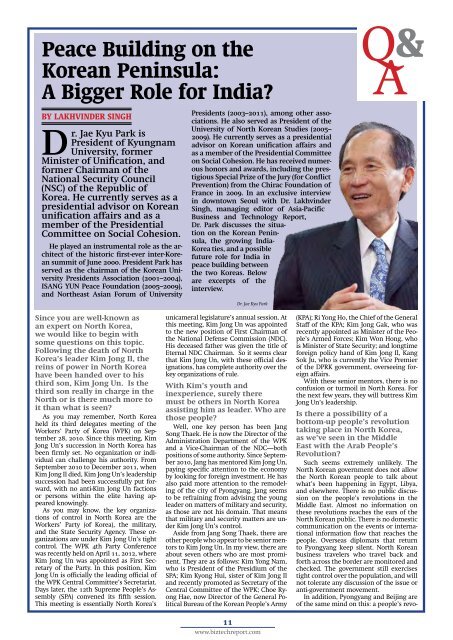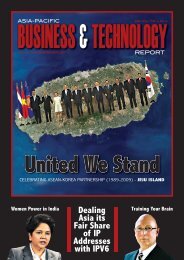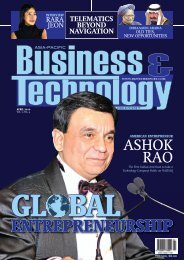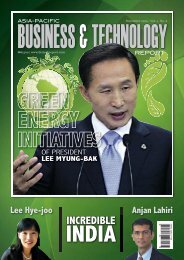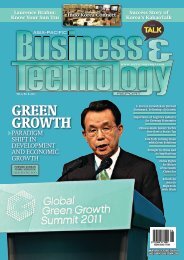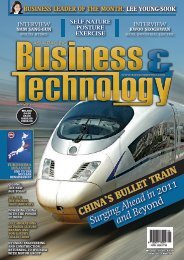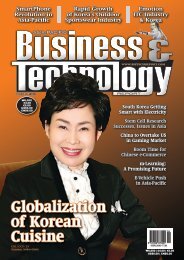INDIA-KOREA - Asia-Pacific Business and Technology Report
INDIA-KOREA - Asia-Pacific Business and Technology Report
INDIA-KOREA - Asia-Pacific Business and Technology Report
You also want an ePaper? Increase the reach of your titles
YUMPU automatically turns print PDFs into web optimized ePapers that Google loves.
Peace Building on the<br />
Korean Peninsula:<br />
A Bigger Role for India?<br />
By Lakhvinder Singh<br />
Dr. Jae Kyu Park is<br />
President of Kyungnam<br />
University, former<br />
Minister of Unification, <strong>and</strong><br />
former Chairman of the<br />
National Security Council<br />
(NSC) of the Republic of<br />
Korea. He currently serves as a<br />
presidential advisor on Korean<br />
unification affairs <strong>and</strong> as a<br />
member of the Presidential<br />
Committee on Social Cohesion.<br />
He played an instrumental role as the architect<br />
of the historic first-ever inter-Korean<br />
summit of June 2000. President Park has<br />
served as the chairman of the Korean University<br />
Presidents Association (2001–2004),<br />
ISANG YUN Peace Foundation (2005–2009),<br />
<strong>and</strong> Northeast <strong>Asia</strong>n Forum of University<br />
Presidents (2003–2011), among other associations.<br />
He also served as President of the<br />
University of North Korean Studies (2005–<br />
2009). He currently serves as a presidential<br />
advisor on Korean unification affairs <strong>and</strong><br />
as a member of the Presidential Committee<br />
on Social Cohesion. He has received numerous<br />
honors <strong>and</strong> awards, including the prestigious<br />
Special Prize of the Jury (for Conflict<br />
Prevention) from the Chirac Foundation of<br />
France in 2009. In an exclusive interview<br />
in downtown Seoul with Dr. Lakhvinder<br />
Singh, managing editor of <strong>Asia</strong>-<strong>Pacific</strong><br />
<strong>Business</strong> <strong>and</strong> <strong>Technology</strong> <strong>Report</strong>,<br />
Dr. Park discusses the situation<br />
on the Korean Peninsula,<br />
the growing India-<br />
Korea ties, <strong>and</strong> a possible<br />
future role for India in<br />
peace building between<br />
the two Koreas. Below<br />
are excerpts of the<br />
interview.<br />
Dr. Jae Kyu Park<br />
Q<br />
a &<br />
Since you are well-known as<br />
an expert on North Korea,<br />
we would like to begin with<br />
some questions on this topic.<br />
Following the death of North<br />
Korea’s leader Kim Jong Il, the<br />
reins of power in North Korea<br />
have been h<strong>and</strong>ed over to his<br />
third son, Kim Jong Un. Is the<br />
third son really in charge in the<br />
North or is there much more to<br />
it than what is seen?<br />
As you may remember, North Korea<br />
held its third delegates meeting of the<br />
Workers’ Party of Korea (WPK) on September<br />
28, 2010. Since this meeting, Kim<br />
Jong Un’s succession in North Korea has<br />
been firmly set. No organization or individual<br />
can challenge his authority. From<br />
September 2010 to December 2011, when<br />
Kim Jong Il died, Kim Jong Un’s leadership<br />
succession had been successfully put forward,<br />
with no anti-Kim Jong Un factions<br />
or persons within the elite having appeared<br />
knowingly.<br />
As you may know, the key organizations<br />
of control in North Korea are the<br />
Workers’ Party (of Korea), the military,<br />
<strong>and</strong> the State Security Agency. These organizations<br />
are under Kim Jong Un’s tight<br />
control. The WPK 4th Party Conference<br />
was recently held on April 11, 2012, where<br />
Kim Jong Un was appointed as First Secretary<br />
of the Party. In this position, Kim<br />
Jong Un is officially the leading official of<br />
the WPK Central Committee’s Secretariat.<br />
Days later, the 12th Supreme People’s Assembly<br />
(SPA) convened its fifth session.<br />
This meeting is essentially North Korea’s<br />
unicameral legislature’s annual session. At<br />
this meeting, Kim Jong Un was appointed<br />
to the new position of First Chairman of<br />
the National Defense Commission (NDC).<br />
His deceased father was given the title of<br />
Eternal NDC Chairman. So it seems clear<br />
that Kim Jong Un, with these official designations,<br />
has complete authority over the<br />
key organizations of rule.<br />
With Kim’s youth <strong>and</strong><br />
inexperience, surely there<br />
must be others in North Korea<br />
assisting him as leader. Who are<br />
those people?<br />
Well, one key person has been Jang<br />
Song Thaek. He is now the Director of the<br />
Administration Department of the WPK<br />
<strong>and</strong> a Vice-Chairman of the NDC—both<br />
positions of some authority. Since September<br />
2010, Jang has mentored Kim Jong Un,<br />
paying specific attention to the economy<br />
by looking for foreign investment. He has<br />
also paid more attention to the remodeling<br />
of the city of Pyongyang. Jang seems<br />
to be refraining from advising the young<br />
leader on matters of military <strong>and</strong> security,<br />
as those are not his domain. That means<br />
that military <strong>and</strong> security matters are under<br />
Kim Jong Un’s control.<br />
Aside from Jang Song Thaek, there are<br />
other people who appear to be senior mentors<br />
to Kim Jong Un. In my view, there are<br />
about seven others who are most prominent.<br />
They are as follows: Kim Yong Nam,<br />
who is President of the Presidium of the<br />
SPA; Kim Kyong Hui, sister of Kim Jong Il<br />
<strong>and</strong> recently promoted as Secretary of the<br />
Central Committee of the WPK; Choe Ryong<br />
Hae, now Director of the General Political<br />
Bureau of the Korean People’s Army<br />
11<br />
www.biztechreport.com<br />
(KPA); Ri Yong Ho, the Chief of the General<br />
Staff of the KPA; Kim Jong Gak, who was<br />
recently appointed as Minister of the People’s<br />
Armed Forces; Kim Won Hong, who<br />
is Minister of State Security; <strong>and</strong> longtime<br />
foreign policy h<strong>and</strong> of Kim Jong Il, Kang<br />
Sok Ju, who is currently the Vice Premier<br />
of the DPRK government, overseeing foreign<br />
affairs.<br />
With these senior mentors, there is no<br />
confusion or turmoil in North Korea. For<br />
the next few years, they will buttress Kim<br />
Jong Un’s leadership.<br />
Is there a possibility of a<br />
bottom-up people’s revolution<br />
taking place in North Korea,<br />
as we’ve seen in the Middle<br />
East with the Arab People’s<br />
Revolution?<br />
Such seems extremely unlikely. The<br />
North Korean government does not allow<br />
the North Korean people to talk about<br />
what’s been happening in Egypt, Libya,<br />
<strong>and</strong> elsewhere. There is no public discussion<br />
on the people’s revolutions in the<br />
Middle East. Almost no information on<br />
these revolutions reaches the ears of the<br />
North Korean public. There is no domestic<br />
communication on the events or international<br />
information flow that reaches the<br />
people. Overseas diplomats that return<br />
to Pyongyang keep silent. North Korean<br />
business travelers who travel back <strong>and</strong><br />
forth across the border are monitored <strong>and</strong><br />
checked. The government still exercises<br />
tight control over the population, <strong>and</strong> will<br />
not tolerate any discussion of the issue or<br />
anti-government movement.<br />
In addition, Pyongyang <strong>and</strong> Beijing are<br />
of the same mind on this: a people’s revo-


